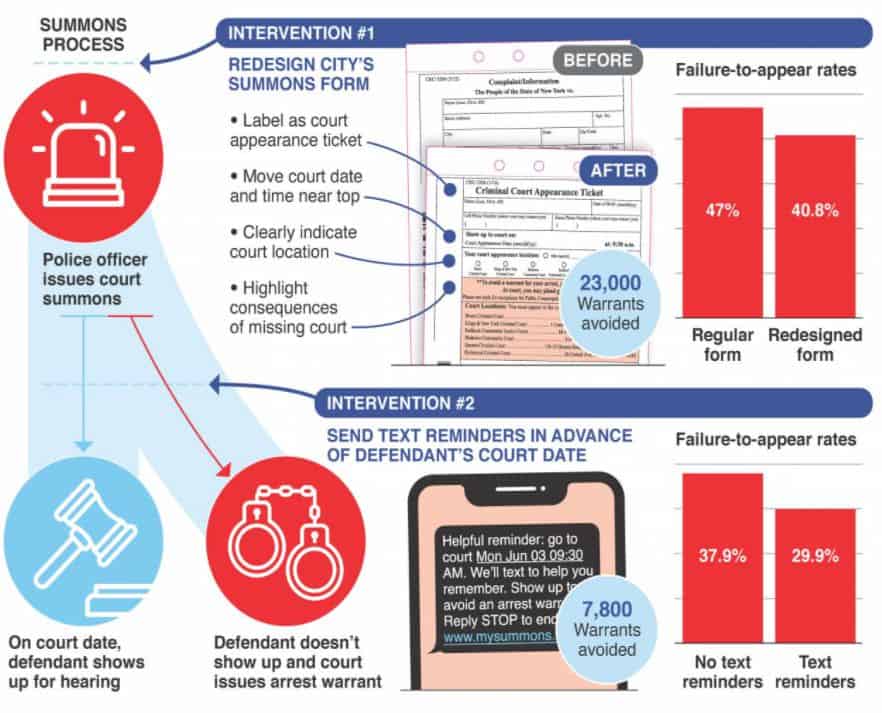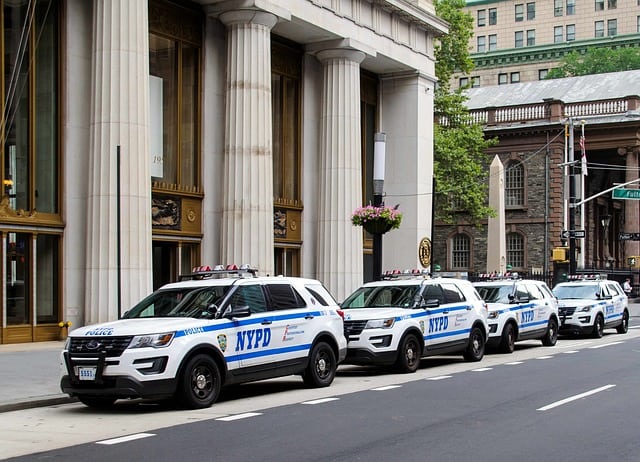A study has made it possible to design two interventions in New York City, in the United States, to reduce the rate of judicial no-shows for minor offences, avoiding more than 30,000 arrest warrants in three years. The success of the actions has been ensured by clearly communicating when and where to go, and sending reminders by SMS.
Every year, millions of US citizens stop attending their subpoenas related to misdemeanours such as theft, unlawful conduct or carrying open bottles of alcohol in a vehicle. Consequently, they are charged with contempt of justice and arrest warrants are issued that dramatically increase the severity of the original crime.
This system is designed to discourage no-shows and assumes that people who do not come before the judge do so on purpose. But what happens when these faults are due to human errors, such as forgetting the date or not understanding exactly what a subpoena is?
This is the hypothesis of a study published in the latest issue of the journal Science that has studied the impact that two types of actions or “help”, as defined by the researchers, have on no-show rates, which improve the communication of information judicial.
The measures are, on the one hand, to make small modifications to the official document of the summons itself, expressing more clearly and as a priority the day, time and place of the appeal, as well as the consequences of not going to court.
On the other, several SMS are sent to the defendants – who have offered their mobile phone as a means of contact – a week before their appointment, as a reminder. According to research estimates, these two interventions have avoided more than 30,000 arrest warrants in a three-year period.
Redesigned citations have achieved the level of the ratio of no lower than 47% to 40%, which translates into 23,000 fewer outstanding warrants. In the case of help with text messages, those who do not provide a phone number have a 37.9% no-show rate, while the people who received reminder SMS miss their court appointments by 29.9%.

Alissa Fishbane is the lead author of the research and director of ideas42, a non-profit organization that uses behavioral sciences to design measures that have scalable social impact. It defends that these interventions are “a complete and low-cost victory for both individuals and the judicial system”, as it prevents people from being arrested for minor crimes and the courts invest resources and time in these arrest warrants.
“Some jurisdictions have already heard some of this work and are asking us to adapt these interventions to their local settings,” says Fishbane, at a press conference. In her opinion, this work is a sample of how to apply behavioral sciences to help people in their day to day lives.
The co-author of the work Aurelie Ouss, a researcher at the Department of Criminology at the University of Pennsylvania, points out that failure to appear (FTA) is “a common characteristic of criminal justice in the United States.”
Some of the actions proposed to reduce FTAs are arrest warrants, which function as a deterrent; The fines, which should serve as a financial incentive; and preventive detentions, “which would bring the no-show rates to zero but at an enormous cost to the judicial system and to the accused,” the researcher explains.
“These policies assume that people are conscientiously weighing the costs and benefits of not going to court. Our study explores measures that take into account the defendants’ lack of knowledge and that are more effective and humane”, she summarizes.
The reasons and consequences of no-shows
Despite the reduction in no-show rates after the interventions in this study, 40% of those called to testify for minor offenses do not attend their appointment with the courts in New York City. What would be the reasons for this contempt?
Although these reasons are not the object of study of this investigation, the expert in criminology points out that the defendants can find many reasons not to go to court: “Some prefer not to miss their work due to the risk of losing their job, they have problems with transportation to get to court or simply choose not to go.”
However, it highlights that this research shows that the lack of knowledge about court appointments is an important barrier that must be taken into account and that it can be resolved with low-cost and humane measures.
On the other hand, the arrest warrants established after no-shows have an important impact on the lives of the accused that must also be assessed. An ethnographic study in Philadelphia showed that people with active warrants often avoid public spaces where they can be identified and arrested.
This means that they will stop going to hospitals, to a job interview; they will be more reluctant to report crimes to the police – even when they are victims – they will prefer not to use social services such as food stamps or job orientation or even change their home for fear of being discovered.
“The next time they interact with a police officer, they will check their name and be arrested, even for a minor infraction,” explains Ouss. In the special case of the foreign population, this can have an impact on their immigration status and access to basic public services.
How are no-shows perceived?
In the second part of the work, Fishbane and his team raised laboratory experiments with professionals and people criminal law without legal knowledge to see how the non – appearances are perceived among these populations.
Thus, the majority belief of the non-expert population is that these breaches of justice are relatively intentional. This belief, the researchers explain, leads to less popular support for interventions such as those designed in this study, which take into account that human error can be a reason for non-appearance.
In parallel, the expert population (prosecutors, judges, defense lawyers) does consider that non-appearances may be due to unintentional rulings such as those described in this work, and support these interventions. “Despite this, the current policy of criminal justice aligns more with popular intuition than experts,” they conclude.
